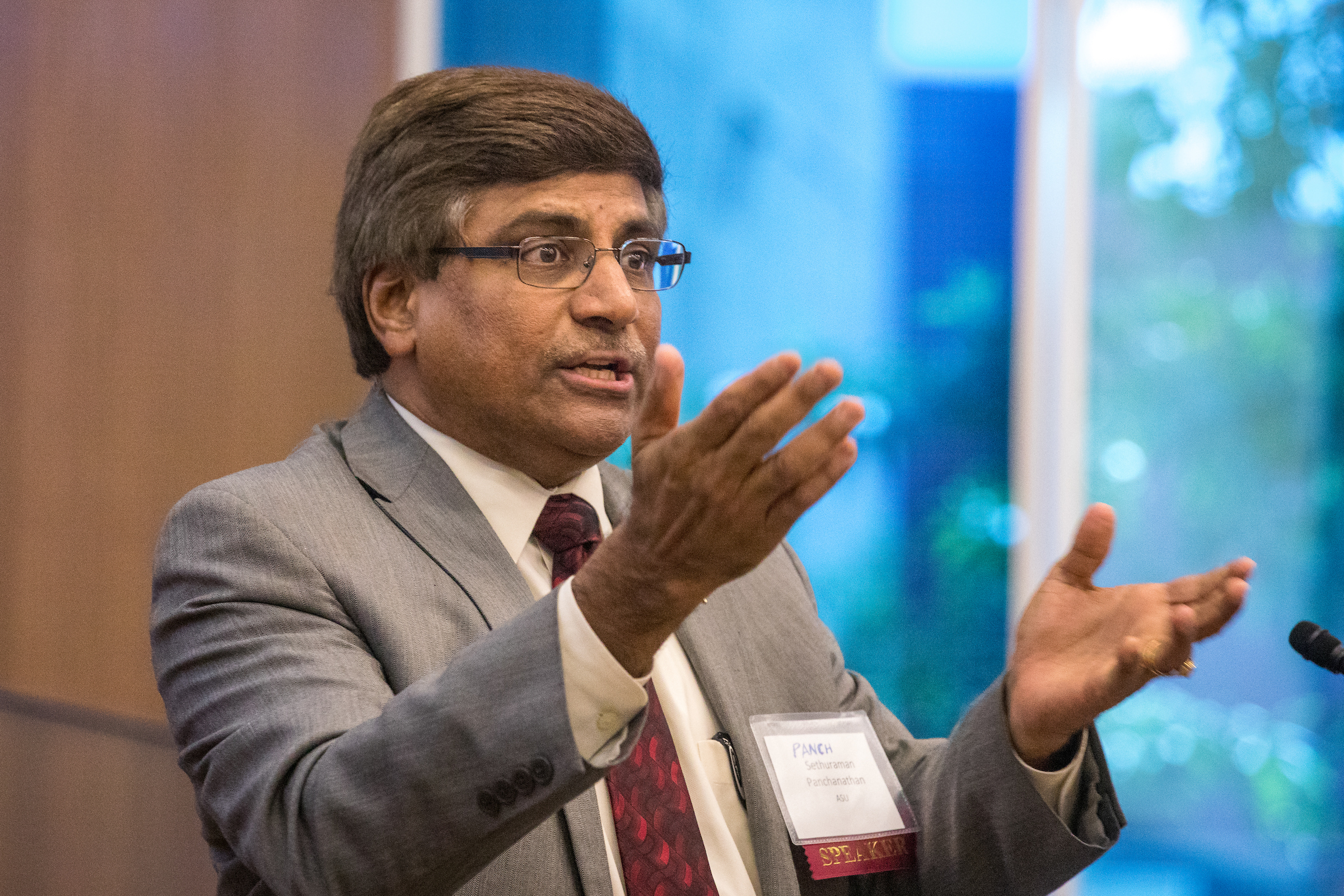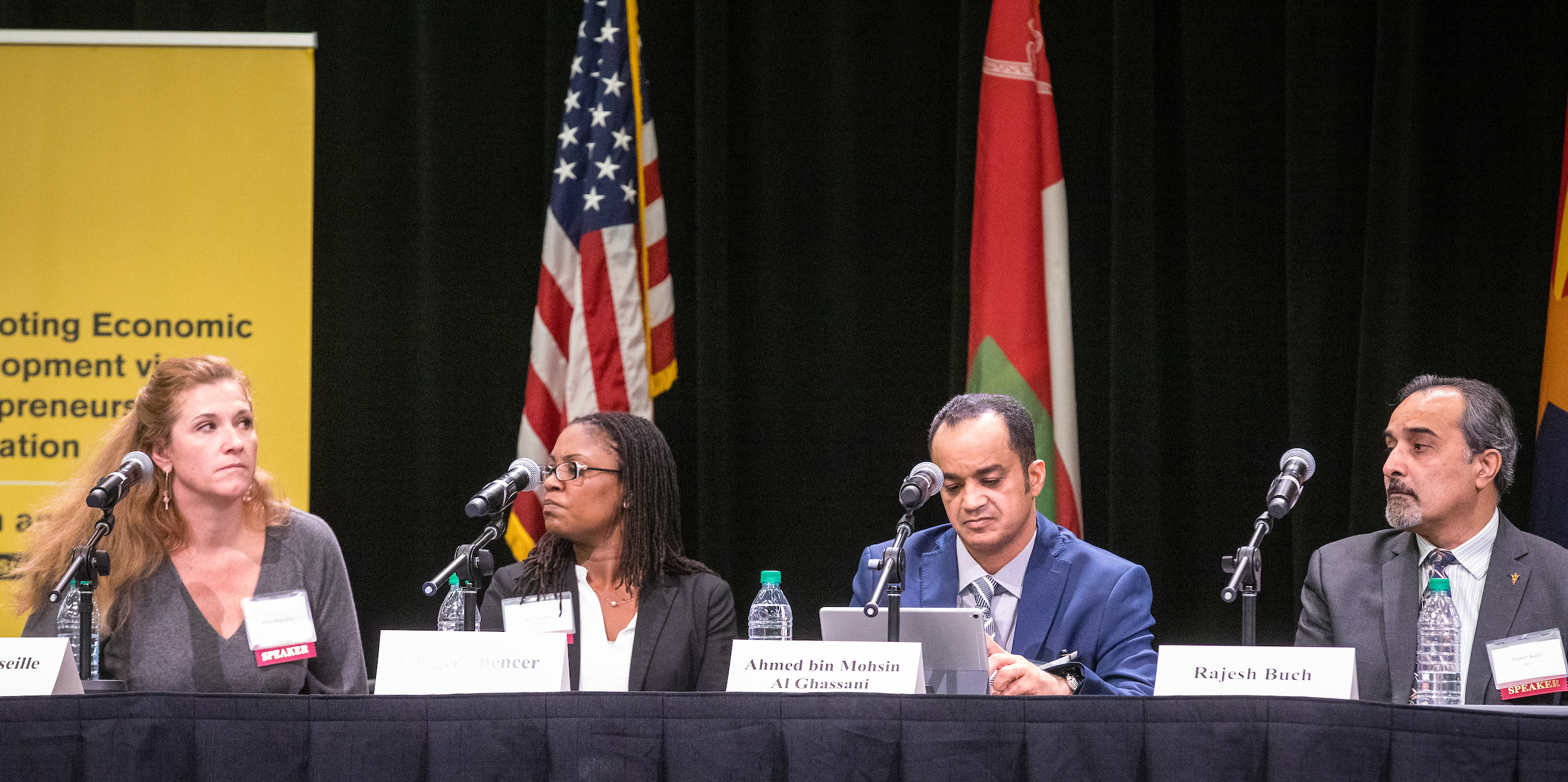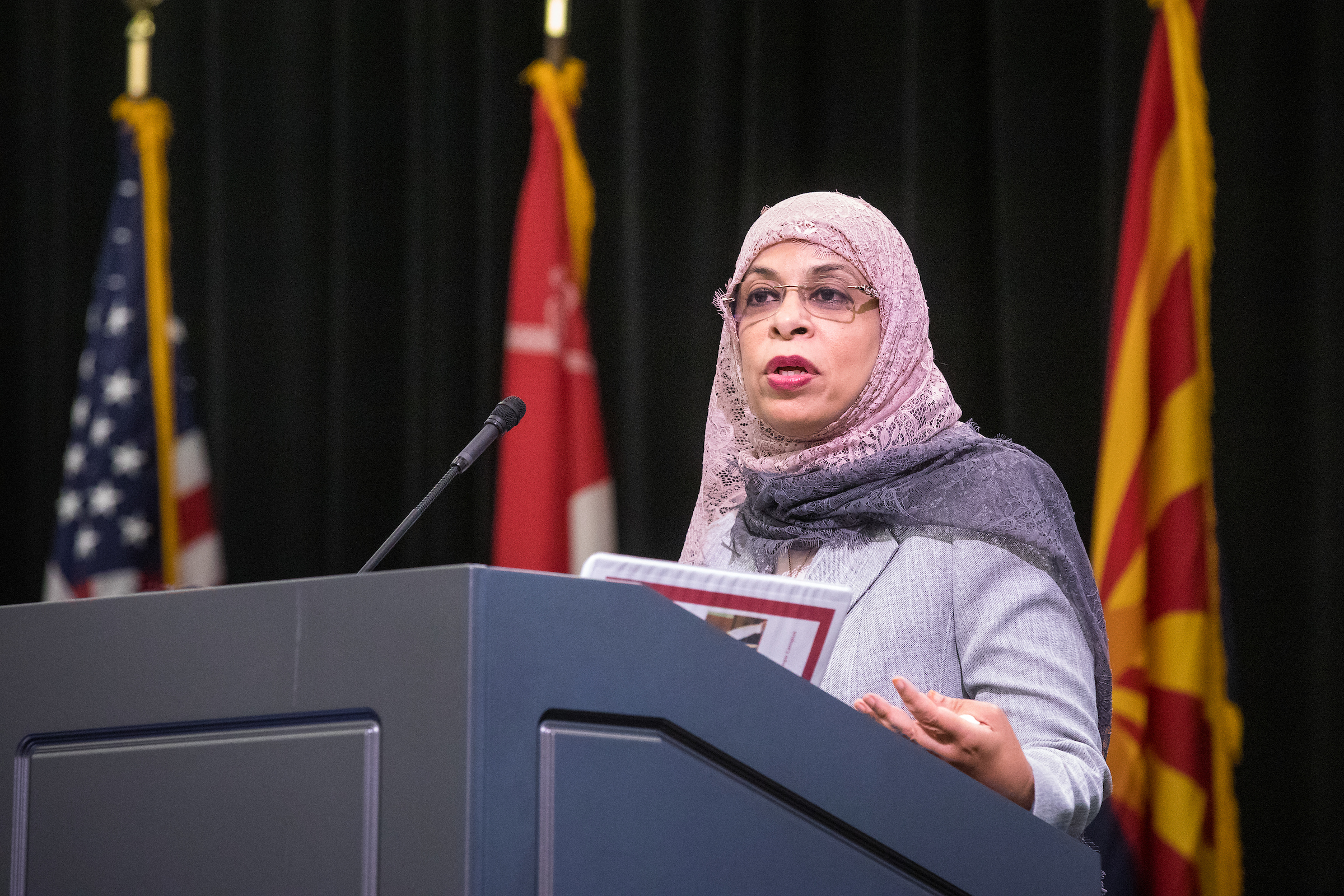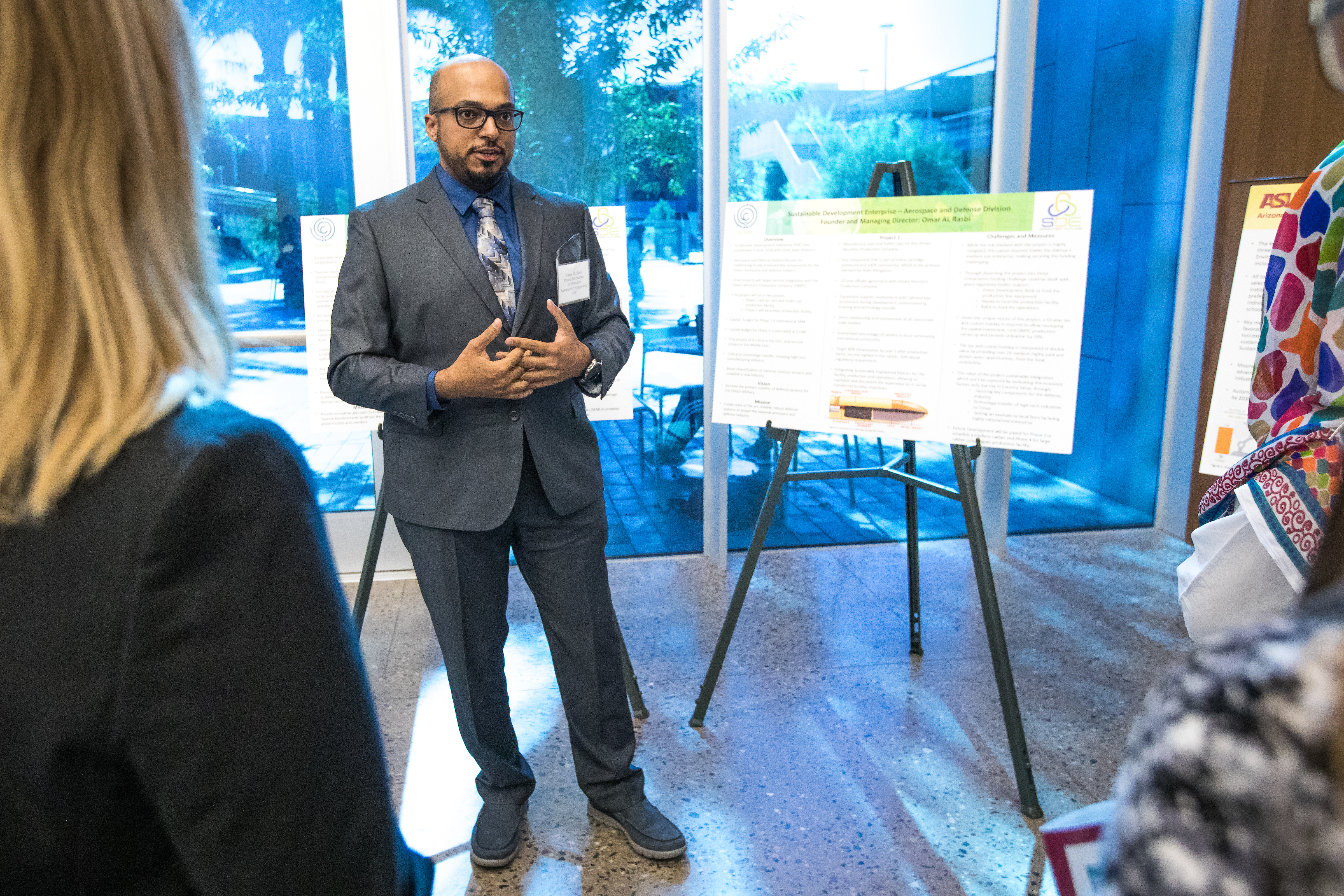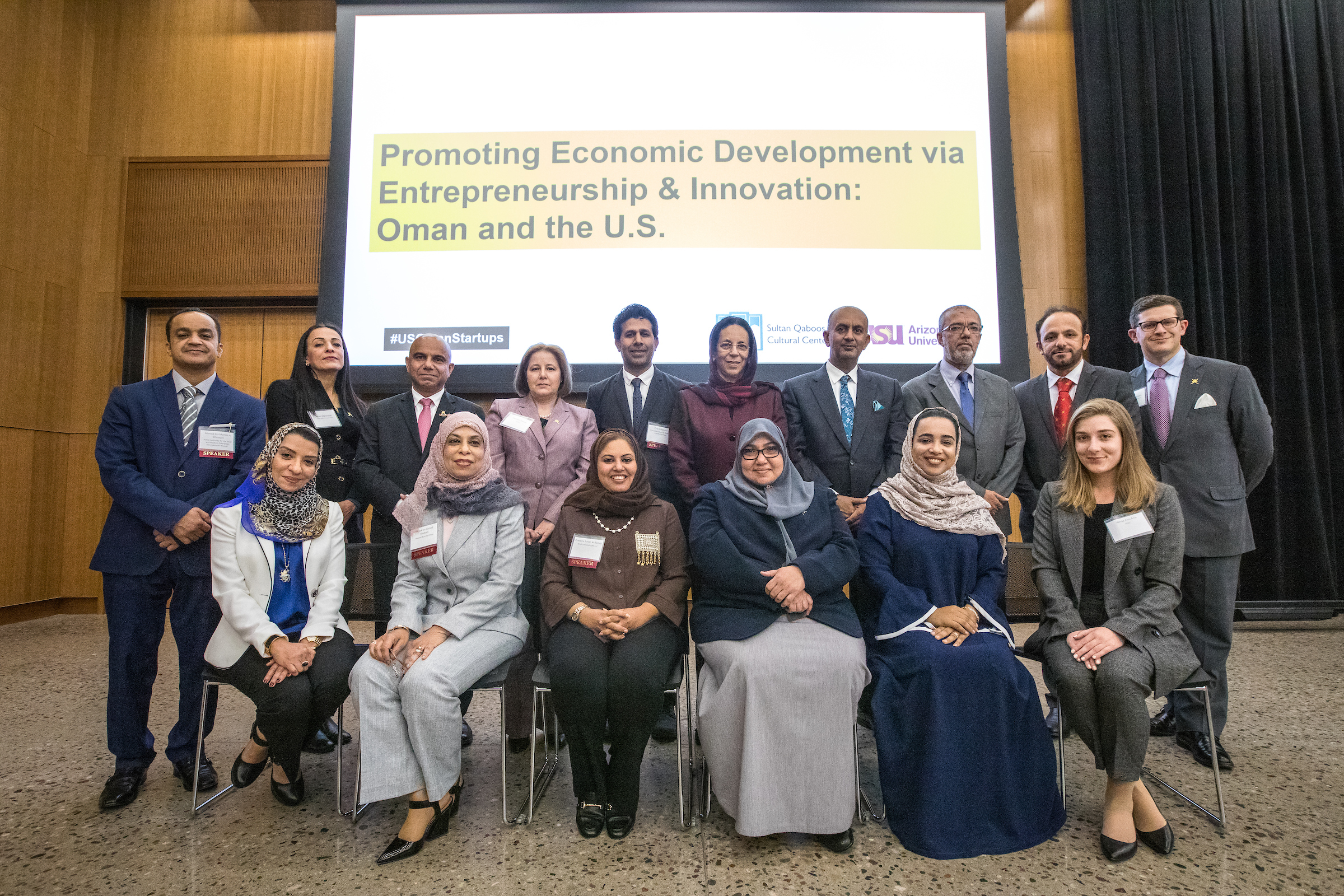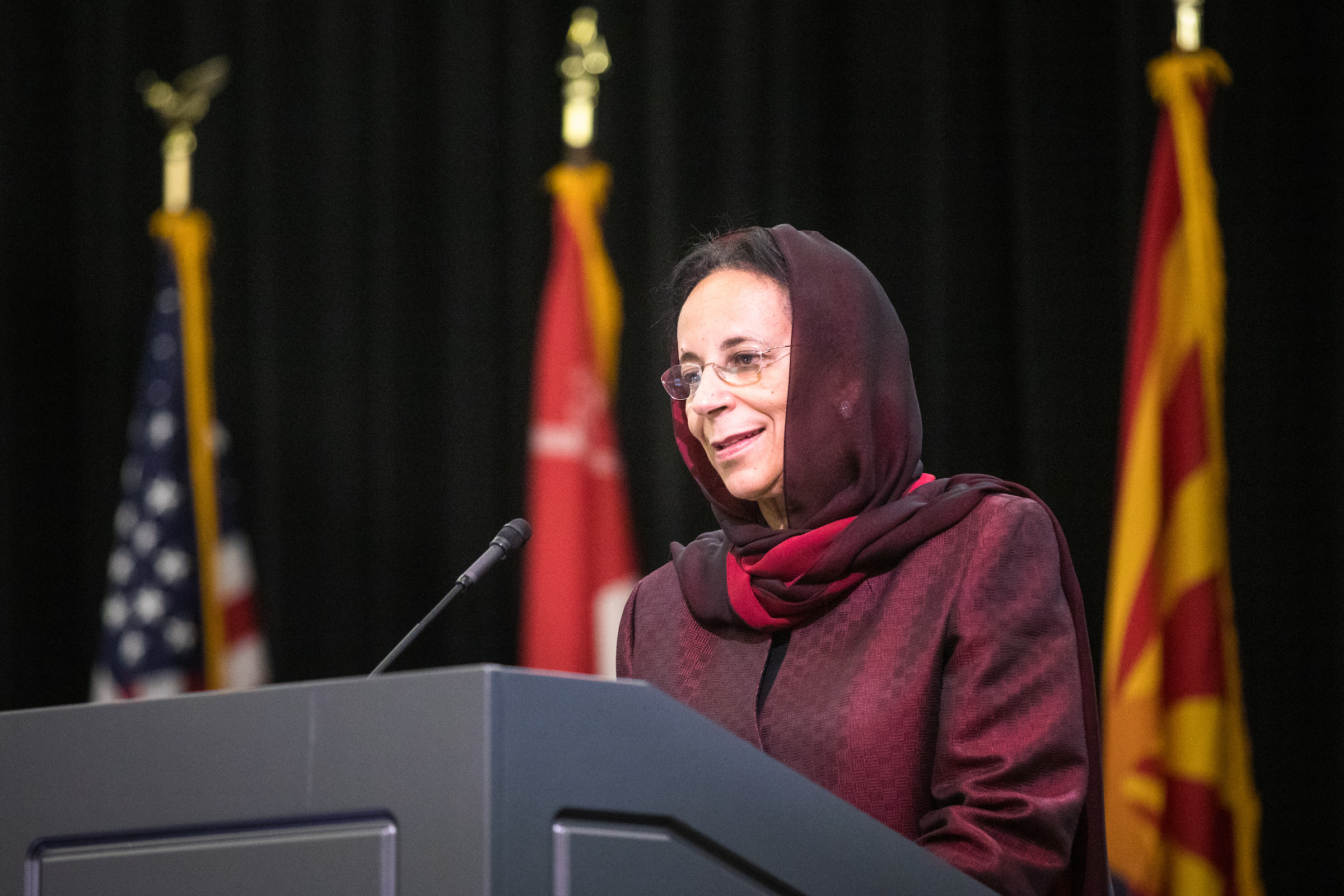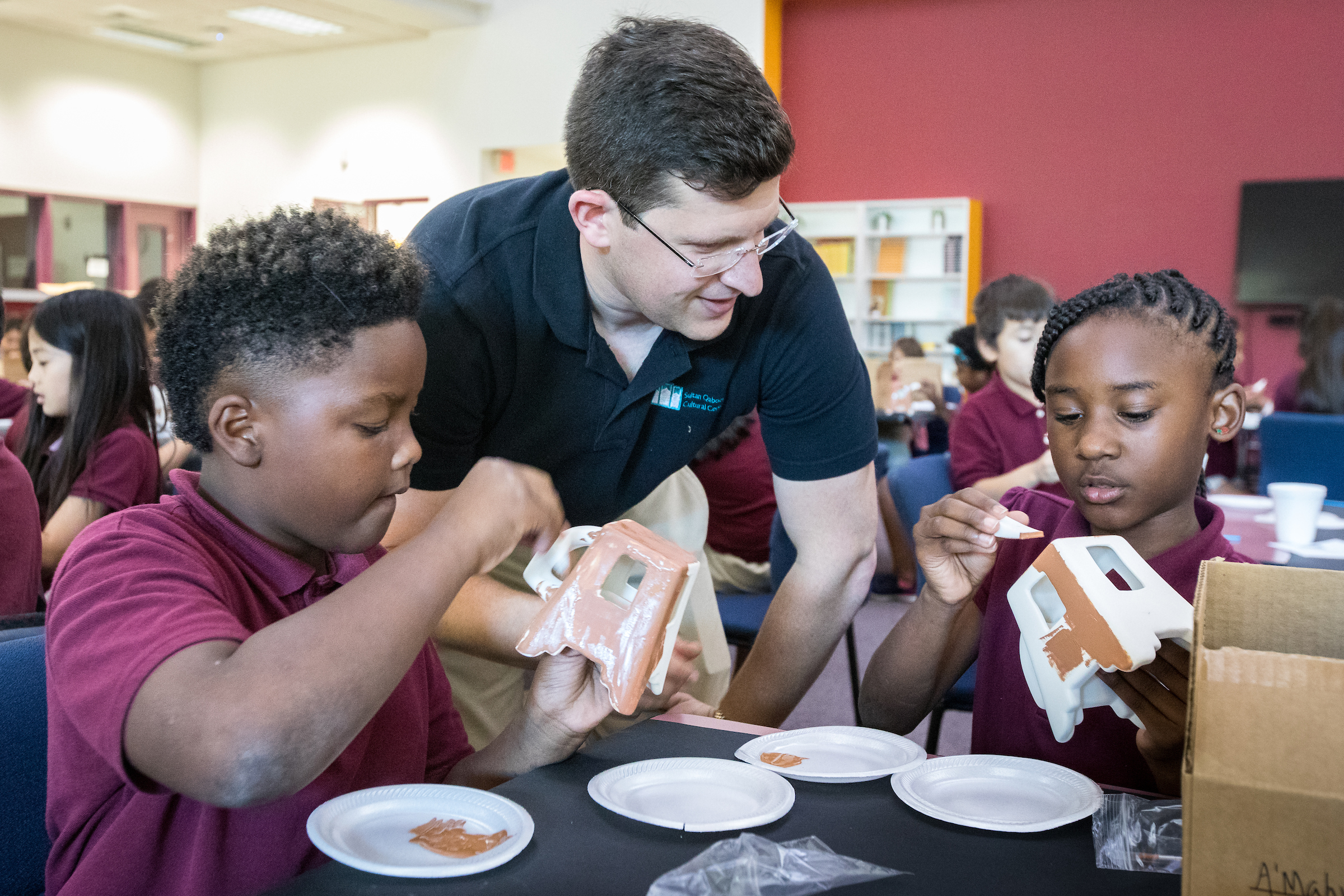Omani delegation visits ASU
Minister of commerce, ambassador and other VIPs on campus to discuss entrepreneurship, circular economies and trade innovation
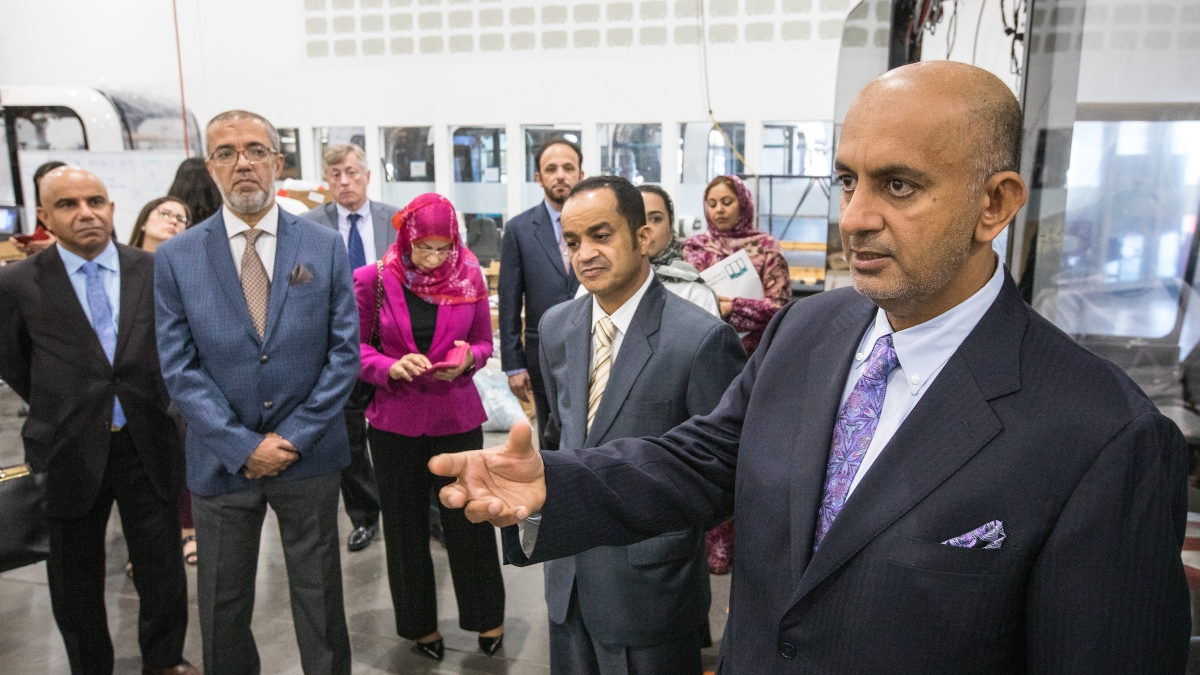
A delegation of officials from the Sultanate of Oman visited Arizona State University this week for the 2018 SQCC ASU Omani Conference: Promoting Economic Development via Entrepreneurship and Innovation, an event organized by the Sultan Qaboos Cultural Center, the education arm of the Omani embassy in Washington, D.C.
Along with ASU officials and local business leaders, they discussed entrepreneurship, trade policies, circular economies and innovation in the global marketplace.
Thursday
Arizona and Oman are both desert regions that are reworking their economies to move from the past to the future, according to the chief innovation officer at Arizona State University.
“We share weather and land, but most importantly, we share the aspiration to be better than ourselves,” said Sethuraman Panchanathan, the executive vice president of knowledge development at ASU.
He spoke at a conference called “Promoting Economic Development via Entrepreneurship and Innovation." Several Omani economic-development officials spent three days visiting the Valley as part of the conference.
ASU was named the most innovative university in the nation for the fourth year in a row not because of one thing it does, but because it has an innovative mindset, Panchanathan said.
“Disruption through innovation is a methodology we constantly pursue,” he said, which makes ASU a vital partner in boosting the state’s economy by moving away from industries like mining and construction and toward technology and entrepreneurship.
Sethuraman Panchanathan, ASU executive vice president and chief research and innovation officer, gives the luncheon keynote speech at the Sultan Qaboos Cultural Center and Arizona State University conference on Thursday. Photo by Charlie Leight/ASU Now
Ali bin Masoud Al Sunaidy, the minister of commerce and industry for the Sultanate of Oman, said he was impressed by the innovation he saw in Arizona.
“When I went to school, we believed in mass production and rigid lines, and what we saw here is that things are becoming more flexible,” he had told students at the Thunderbird School of Global Management at ASU at an event Wednesday. “And with that flexibility, we can tap into minds all over the world.”
Ji Mi Choi, associate vice president in the Office of Knowledge Development at ASU, said she hoped the event results in partnerships between Omani and American businesses.
“It seems that the resonant theme has been that partnership is good and that finding the right partner is good and that building community is essential,” she said.
“We wanted to share the idea that we have so much more in common than differences.”
Among the topics at the conference on Thursday were:
Public-private partnerships for sustainability
While trying to grow other aspects of its economy, Oman also is looking to make its oil-production sector more sustainable. Ahmed bin Mohsin Al Ghassani, CEO of the Public Authority for Small and Medium Enterprise Development in Oman, described a partnership with a German company that uses solar power to create steam to extract oil. The water is then cleaned by running through reed beds and reused for drilling new wells or for irrigation.
“Oman’s movement from a linear economy to a circular economy focuses on the design stage,” he said. “We make sure that whatever has been produced is reused and reused and reused and even if it goes into waste, we look at recyclable waste.”
Alicia Marseille, director of the RISN incubator at ASU, has worked with 16 early-stage companies in less than two years. One of the startups is Renewlogy, which takes low-value packaging like granola bar wrappers and turns it into diesel. Marseille said that the company will soon build a microfactory in India to work with garbage pickers there, most of whom are women.
Ginger Spencer, director of public works for the city of Phoenix, said that the city's Reimagine Phoenix initiative is a partnership to increase waste diversion, including a new facility to turn yard waste into compost.
“We’re giving that compost to our parks department to apply instead of using liquid fertilizer, and ASU is helping us study if it helps reduce water usage,” she said.
“If we’re tearing up roads, we want to recycle that old asphalt, and we’re working with ASU to come up with a new product to reapply recycled asphalt to city streets,” she said.
(From left) Alicia Marseille, the director of RISN Incubator at ASU; Ginger Spencer, director of the city of Phoenix's public works; Ahmed bin Mohsin Al Ghassani, CEO of Public Authority for Small and Medium Enterprises Development in Oman; and Rajesh Buch, ASU's director of sustainability practice with international development, listen to a question following their discussion on public-private partnerships on Thursday. Photo by Charlie Leight/ASU Now
Developing vibrant entrepreneurship ecosystems
The entrepreneurial culture is relatively new in Oman, according to Malak Al Shaibani, director general of the national business center, an incubator for small- and medium-size businesses. The effort at boosting startups dates to 2013, when the country started moving away from economic dependence on oil.
She said that most college graduates want jobs in the public sector or oil industry and that families typically don’t encourage sons and daughters to start businesses.
“We wanted to make entrepreneurship an attractive option, so one of the key things is to celebrate it,” she said, so the government has started competitions and hackathons and encouraged media attention.
Al Shaibani said that initially, most startups were about self-employment, like interior design and videography.
“Gradually we started seeing more innovative ideas, including home-based solutions for the energy sector,” she said.
“Creating high-level jobs, like for engineers, is very important to us.”
Arizona is already an exciting community for startups, according to Diana Vowels, general manager of Galvanize, a coding boot camp and co-working space located in a former produce warehouse in Phoenix.
“Arizona was one of the first states to pass legislation that digital signatures through blockchain are legally enforceable,” she said.
Brandon Clarke, co-founder of StartupAZ Foundation, sees Phoenix, with a lower cost of living, as a “boomerang” for talented entrepreneurs and engineers, many of whom go to the Bay Area right after graduation.
“But when you’re 29 or 30 and thinking of starting a family, having five roommates can be a drag,” he said.
The Oman National Business Center's director general, Malak Al Shaibani, speaks during a panel discussion on developing vibrant entrepreneurship ecosystems on Thursday. Photo by Charlie Leight/ASU Now
Advancing industry
Awareness is key to being ready for the future, according to Megan Garcia, senior fellow and director of growth for the New America Foundation.
“Because of technology eliminating the need for repetitive tasks, about one of three jobs will change dramatically or go away in the next few years,” she said.
“The jobs most likely to change are the lowest-paid jobs like cashiers, food-service workers and back-office workers. We need to be aware of the changes that are coming.”
The rebirth of downtown Phoenix is thanks to collaboration by leaders, according to Christine Mackay, economic development officer for Phoenix. She described how in the 1990s, when Glendale lured away the football stadium project, leaders had to go to Plan B.
“The thought leaders got together and said, ‘Why don’t we go with bioscience,’ which was cutting edge in the late 1990s,” she said.
“And Phoenix’s investment of $59 million has morphed into half a billion dollars of economic impact downtown.”
For Tempe, the economic driver is Tempe Town Lake, according to Donna Kennedy, economic development director.
“We have now over $2 billion worth of investments along the lake and over 40,000 high-wage jobs,” she said. “Going from a muddy river bottom to an employment corridor is something we’re excited to have.”
Omani doctoral student Omar Al Rasbi, who also earned his MBA and MSE at ASU, presents his poster on sustainability in the construction industry during the lunch break at the conference on Thursday. Photo by Charlie Leight/ASU Now
Developing a digital marketplace
Tom Spengler dispelled the stereotype of Silicon Valley entrepreneurs as hoodie-wearing college dropouts.
“The reality is that a lot of founders in tech are experienced businesspeople,” said Spengler, the chief revenue officer of Coplex, a startup accelerator that also builds technology.
“But one of the amazing things about Silicon Valley I have yet to see replicated in Phoenix is the intense ecosystem of support,” he said.
“It’s the only place I’ve been where you can go into a coffee shop at 10 p.m. on a Saturday night and work three hours and everyone thinks it’s cool.”
Research was the key to a successful company in Oman. Dr. Amaal Rashid Al Abrawi left her job as a physician to become CEO of Oliban, a company that makes products out of frankincense, which is the fragrant dried sap of the frankincense tree, the national tree of Oman.
“We are extracting one of the finest oils in the world using a green technology that does not use solvent or water,” she said.
Frankincense oil is touted as boosting the immune system and easing respiratory illness and joint pain. Oliban, with mostly female employees, makes products including shampoo, shower gel, facial cleanser, a balm and a nasal inhaler.
“We looked into research around the world and (have) taken that and produced a product,” she said.
Heidi Jennega, co-founder and president of Phoenix-based WebPT, needed to be more efficient in her own physical therapy practice. So she started her electronic medical-records company 10 years ago in the back of a coffee shop.
“When we started our company, 80 percent of therapists used pen and paper, and now 80 percent are using a digital platform,” she said. “Of that 80 percent, 40 percent are using WebPT.”
Firas Khamis Ahmed Al Balushi is an example of the new entrepreneurial spirit in Oman.
The Omani delegation, including staff from the SQCC, pose at the Sultan Qaboos Cultural Center and Arizona State University Conference on Thursday. Photo by Charlie Leight/ASU Now
Al Balushi, who has degrees in physics and astronomy, always wanted a space where people like him could build and invent things, but it didn’t exist. After a government loan fell through, he and his team literally built the Innovation Factory for Research and Development themselves. In 18 months, the makerspace has accommodated more than 700 projects.
He said one client was selling homemade soap on Instagram, but she was having trouble cutting the final product.
“We put her into a five-step program that taught her to turn an idea into a prototype, and she built herself a soap-cutting machine,” he said.
“The last time I checked Instagram, she doesn’t sell soap anymore. She sells the machine.”
Al Balushi recalled that the last time he was in the United States, he was 5 years old.
“My father took me to Kennedy Space Center and I saw the space shuttle, and from that moment I decided to become a scientist and inventor,” he said.
“America has this amazing power to inspire.”
Wednesday
Conversation on trade at Thunderbird School of Global Management
As Oman has looked to reduce its economic dependence on oil, the country has embraced entrepreneurship and technology to create new opportunities, according to the minister of commerce and industry for the Sultanate of Oman.
“Because we’re outward-looking, that will help us migrate to a more knowledge-based economy than oil and gas,” said Ali bin Masoud Al Sunaidy.
He addressed students at the Thunderbird School of Global Management at Arizona State University on Wednesday.
“I understand the diversity of this school, and what’s interesting is to see how business and academics has come together,” he said. “What we see is a collaborative spirit as opposed to a competitive spirit.”
Al Sunaidy said that as oil prices started declining a few years ago, his government began helping people create businesses ranging from fish farming to drone technology.
“Today, many young people want to work for themselves. People are working as freelancers and running companies together and creating jobs for others,” he said.
He said that the government consulted with local officials all over the country.
“We asked them, ‘Do you want roads or a hospital or a school?’ And they said, ‘No, give us Wi-Fi.’”
Ambassador of the Sultanate of Oman to the U.S. Hunaina Sultan Al Mughairy speaks at the 2018 SQCC ASU Omani Conference on Thursday. Photo by Charlie Leight/ASU Now
Oman’s ambassador to the United States, Hunaina Sultan Al Mughairy, also discussed her country’s efforts at moving away from oil, including a free-trade agreement with the U.S. that went into effect in 2009, which resulted in a 60 percent increase in exports from Oman to the U.S.
“The agreement has been a win-win between Oman and the U.S.,” said Al Mughairy, who also is an economist.
“When you have a free-trade agreement, you have a lot of competition, which encourages our industries to work twice as hard.”
Al Sunaidy lamented the recent shift by the United States toward more protectionism.
“Unfortunately, trade wars have become fashionable in the last year or so,” he said.“You cannot make money out of barriers. People will run around barriers.”
Sanjeev Khagram, the dean and director general of the Thunderbird School of Global Management based at ASU’s Downtown Phoenix campus, told the Omanis that his school has students from 45 countries.
“Our goal is always a world in which we connect and collaborate and trade and prosper together,” he said.
Al Sunaidy told the students that it’s up to them to harness technology to shape the future.
“You have to come up with unconventional solutions to conventional problems.”
Startup crawl: Local Motors in Chandler
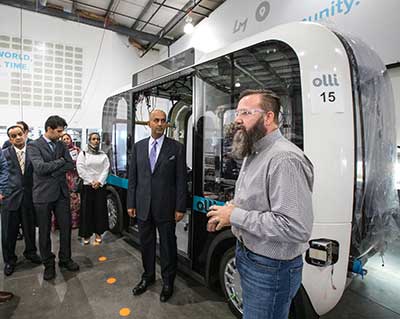
Phil Rayer, Local Motors manufacturing vice president and general manager, gives a tour of the Chandler facility with the Olli autonomous trolley vehicles on Wednesday morning. Photo by Charlie Leight/ASU Now
The delegation of Omani officials saw the future of vehicle manufacturing in Chandler on Wednesday morning and learned that it is at once global and hyperlocal.
“We have 50,000 engineers working online from every country,” said Phillip Rayer II, vice president of manufacturing and general manager for Local Motors. “We’re as diverse a company as we can be.”
Local Motors is researching, developing and manufacturing the Olli, an autonomous, 12-seat vehicle that was created through a global design challenge. The first batch of Olli vehicles was made with aluminum frames, but the newest version on display at Local Motors is made of polymer and created by a 3D printer.
So while people are working on Olli from all over the world, each vehicle can be created — and customized — by a 3D printer locally and assembled in a microfactory.
That capability was especially intriguing to Al Sunaidy.
“For quite some time we could not get vehicles in white, in Toyotas or Lexus, because of centralization,” he said. “The future is decentralization and personalization. That allows you to minimize cost and maximize efficiency.”
Rayer said that Local Motors is designed to make its work obsolete as it goes.
“The goal of a microfactory is to look for the new thing, grow the product and then pass it on,” he said. Local Motors will likely make about 1,000 Olli vehicles before moving on to something else.
“We could change out the build floor in literally one week and start building drones,” he said.
Al Sunaidy, who has a degree in industrial engineering, recalled the rigid manufacturing protocols he learned years ago.
“We need to get out of that box,” he said.
Sultan Qaboos Cultural Center senior program officer Harrison Guthorn (center) chats with Kashmaree Patterson (left), 8, and Annahy Carrion, 9, as they paint replicas of a majmar, an Omani frankincense burner, with around 70 other third-graders at ASU Prep Academy in downtown Phoenix on Tuesday. Photo by Charlie Leight/ASU Now
Tuesday
Frankincense crafts with ASU Prep Phoenix Elementary
Sixty third-graders at ASU Prep Phoenix Elementary School spent Tuesday afternoon learning about another desert area that’s far away.
The children participated in an art project and presentation about the history and culture of Oman in a presentation by the Sultan Qaboos Cultural Center.
“Oman has a long history and a long culture, and what you will do today is experience that culture firsthand,” said Harrison Guthorn, senior program officer for the center, the education and cultural arm of the embassy of the Sultanate of Oman in Washington, D.C.
Guthorn talked about frankincense and led the children in a craft in which they painted ceramic “majmars,” the frankincense burners that are a symbol of Omani culture.
“You’ve heard the story of the three wise men bringing gifts to baby Jesus, and one of the gifts was frankincense,” he said.
He showed photographs of frankincense, the hard, amber-colored pellets of dried sap from the frankincense tree, which is native to Oman. The trees grow in the Dhofar desert region of the country and get rain only once a year.
“In the ancient world, thousands of years ago, frankincense was worth more than gold because of how rare it was,” he said.
Third-grader Annahy Carrion had never heard of frankincense before, but she enjoyed the project, in which she painted her majmar brown and blue.
“I like that it’s different because I’ve never seen anything like this before,” she said.
Guthorn said that in Omani culture, the majmars are a sign of welcome and hospitality.
“They burn frankincense in these burners to welcome people into their homes,” he said. “It produces a thick white smoke that smells good as a way of saying hello. It’s also a really good bug repellent.”
Video by Jamie Ell/ASU Now
Top photo: Ali bin Masoud Al Sunaidy (right) asks a question during a tour of the Local Motors Chandler facility with the Olli autonomous trolley vehicles on Wednesday. The Valley-based manufacturer focuses on low-volume sustainable transportation created through open-source design and utilizing multiple micro factories. Photo by Charlie Leight/ASU Now
More Environment and sustainability

Celebrating Earth Day around the world
Originating in the United States in 1970, Earth Day is now celebrated worldwide. But even before it became an official day, many countries were already mindful of their carbon footprint in their…

A run on fossil fuels: ASU professor says climate legislation could have unintended consequences
As concerns about climate change grow, policymakers are increasingly voicing support for stricter fossil fuel legislation. Their discussions and proposals raise questions about the future of the oil…
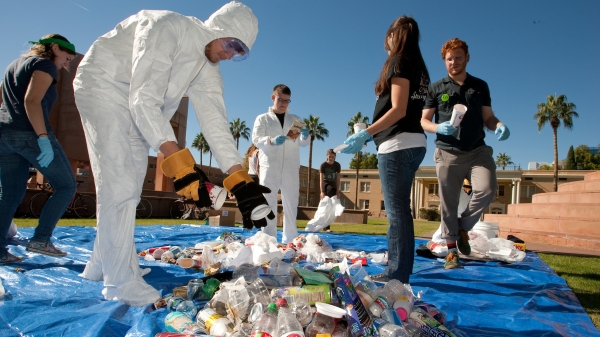
Confusion complicates US recycling efforts
In most major cities and buildings, recycling bins can often be found alongside trash bins in an effort to encourage recycling. But is it working? According to the U.S. Environmental Protection…
